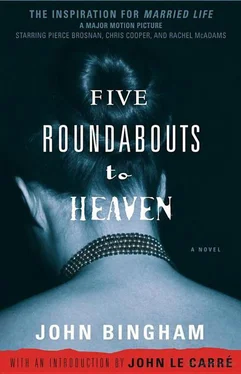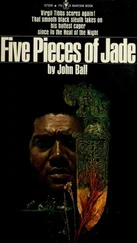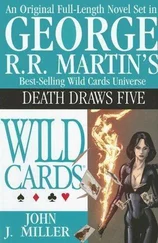John Bingham - Five Roundabouts to Heaven
Здесь есть возможность читать онлайн «John Bingham - Five Roundabouts to Heaven» весь текст электронной книги совершенно бесплатно (целиком полную версию без сокращений). В некоторых случаях можно слушать аудио, скачать через торрент в формате fb2 и присутствует краткое содержание. Жанр: Криминальный детектив, на английском языке. Описание произведения, (предисловие) а так же отзывы посетителей доступны на портале библиотеки ЛибКат.
- Название:Five Roundabouts to Heaven
- Автор:
- Жанр:
- Год:неизвестен
- ISBN:нет данных
- Рейтинг книги:4 / 5. Голосов: 1
-
Избранное:Добавить в избранное
- Отзывы:
-
Ваша оценка:
- 80
- 1
- 2
- 3
- 4
- 5
Five Roundabouts to Heaven: краткое содержание, описание и аннотация
Предлагаем к чтению аннотацию, описание, краткое содержание или предисловие (зависит от того, что написал сам автор книги «Five Roundabouts to Heaven»). Если вы не нашли необходимую информацию о книге — напишите в комментариях, мы постараемся отыскать её.
Five Roundabouts to Heaven — читать онлайн бесплатно полную книгу (весь текст) целиком
Ниже представлен текст книги, разбитый по страницам. Система сохранения места последней прочитанной страницы, позволяет с удобством читать онлайн бесплатно книгу «Five Roundabouts to Heaven», без необходимости каждый раз заново искать на чём Вы остановились. Поставьте закладку, и сможете в любой момент перейти на страницу, на которой закончили чтение.
Интервал:
Закладка:
He examined the amount which remained: as he had guessed, there was enough left for about one dose. Some of this, too, he extracted, to leave room for the altrapeine.
He unscrewed the top of the little bottle holding the altrapeine powder, and poured the whole amount into the palm of his left hand. Then he tipped up the medicine bottle, and added the remains of the digestive powder.
With the handle of the teaspoon, he stirred the two powders together; round and round, occasionally lifting some of the mixture from the bottom and sprinkling it on top. He stood for about two minutes, stirring and lifting, and stirring again.
Purposely, he had added considerably more altrapeine than the maximum fatal dose. He had to allow for the possibility that Beatrice would not entirely empty the bottle. Finally, again using the narrow handle of the spoon, he carefully ladled the mixture into the medicine bottle, and replaced the screw top.
He rinsed out the little aspirin bottle and put it in his trousers pocket, and filled the tooth-mug with water and emptied it, to make it seem as though it had been used. He wetted the appropriate end of the teaspoon, and washed his hands.
It was done now.
The stuff was in the bottle. There was little more to do, at least at the flat. He took the bottle and spoon into the kitchen, wiped the spoon on a teacloth, and replaced it in its proper place. Beatrice was still at the sink.
“Where shall I put the medicine?” he asked.
“Put it by my bed, will you?”
He went into the bedroom and placed it by her bedside, and looked slowly round the room. Then he went into the sitting room and glanced round there, too. He might as well remember it. It would never be the same again.
He might spend part of one more night there, but that was all. After that he would leave, and stay in a hotel; or go away. That would be better. He would ask for a week or two off, and go away; anywhere, so long as it was not near the flat. Or near Lorna.
He would have to keep away from Lorna for at least a month; possibly more. She would understand, except that, not knowing the circumstances, she would put it down to his delicacy of feelings.
He would not be able to marry her for at least a year. It would be unwise to show any indecent haste. There again, chaps were inclined to go wrong: indecent haste; tongues wagging; malicious gossip; tales reaching the police; all inaccurate, of course, but perhaps enough to make the police start making inquiries.
Not that they would be likely to get far, at that late date. Still, you couldn’t be too careful.
He went into the hall and put on his overcoat and gloves, and picked up his soft brown hat. It was time to be off.
So that was that.
All that remained now was to say goodbye to Beatrice.
He walked down the passage to the kitchen, and went in, and kissed her on the lips, showing neither more nor less warmth than he normally did.
“Bye-bye, darling,” Beatrice said, and turned back to some cutlery she was polishing.
“Bye-bye,” said Bartels, “take care of yourself.”
“I will,” said Beatrice. “You, too.”
He turned and walked out of the kitchen, and down the passage, and out of the front door. He closed the front door behind him, and walked down the stairs.
At that moment, what worried him more than anything else was the complete lack of emotion which he felt. Again he seemed to be watching himself, rather than taking part in the scene.
He had expected a wave of emotion to flood him when he said goodbye to Beatrice for the last time. But it didn’t happen. He felt unmoved. As though that morning were the same as any other morning. As though, when he returned that evening, Beatrice, as she often was, might still be awake; sitting up in bed reading, waiting for him, waiting to greet him with a cheerful word, and ask him if he wanted a cup of tea.
It didn’t seem right to feel as he did: cold, unexcited.
He began to wonder whether, in fact, he was the abnormal, callous brute history would make him out to be if things went wrong.
Up to now, he had told himself that he was actuated by pity. But even though his philosophy about death was genuinely felt, should he not have experienced a tinge of the same pity when he said goodbye to Beatrice?
Maybe he was indeed abnormal, in some way. Maybe the secret thrill of defeating the police system, of raising himself in his own esteem, played a bigger part in the matter than he had realized.
A worried frown creased his forehead as he left the house.
For the first time, he had grave doubts about his actions. He tried to brush them aside.
He was working at head office that day; checking his sales record, answering letters, sending out other letters to say that he would be in such-and-such a town on such-and-such a date, and would like to call and present his compliments to this buyer and that. Mapping out itineraries. Writing to hotels booking rooms.
At lunch time, he took an Underground train to Victoria station, and went up into the mainline station, and paused outside the Boots chemist shop which is near to the station hotel.
He looked through the door.
Several people were standing at the counter waiting to be served. He went in.
Trade was suitably brisk, the assistants serving one customer and passing to the next with hardly a glance at them. Cough drops. Cold mixtures. Purges. Toothpaste. Soap. Goods and money changed hands quickly. He asked for a bottle of the digestive powder.
“Small bottle or large?” asked the assistant.
Bartels thought furiously.
Which? Which size was the correct one? Which? He didn’t know. He just had no idea. This was it. Or could be it. The unforeseen. The unexpected thing which drew attention to you. The thing you couldn’t guard against.
He pretended not to have heard. “I beg your pardon?”
“Small bottle or large, sir?”
“Oh. Small, please.”
He would recognize it when he saw it. If it were the wrong size, he would go elsewhere and buy the right size. She took a bottle from a shelf, and he at once saw it was the right size.
“Don’t bother to wrap it up.”
He gave her the exact money, and she turned to the till, and to the next customer. He was just one of the many; a nondescript-looking little man in a grey coat and brown hat, wearing spectacles. Nothing there to excite the interest of a young and romantic chemist’s assistant.
He took a bus back to Hyde Park Corner, and walked down Piccadilly to the office. Before going in, he had a sandwich and a large whisky in a public house.
The day wore slowly on.
From time to time, he thought: Perhaps she has not waited till this evening. Perhaps she has had an unexpected attack of indigestion and has already taken the dose.
You couldn’t tell. She might already be dead.
His heart began to beat faster as he contemplated the possibility: that would be finality, and he, Philip Bartels, traveller in wines, would be a murderer.
Shortly after four o’clock he could stand the suspense no longer. He dialled the number of the flat.
Instead of the ringing tone, he obtained a high-pitched whining tone. He dialled a second time with the same result.
With a sick feeling at the back of his throat he dialled O and spoke to the operator.
The cold, impersonal little voice at the other end of the line asked him to hold on. He heard her test the number herself, and then say:
“I’m sorry, caller, the line is out of order.”
“Can you have it put right at once?” He hesitated. “It’s important,” he began and then stopped. He couldn’t afford to make a fuss, to draw attention to himself.
“I’ll report it to the engineers’ department,” said the girl in her cool voice.
Читать дальшеИнтервал:
Закладка:
Похожие книги на «Five Roundabouts to Heaven»
Представляем Вашему вниманию похожие книги на «Five Roundabouts to Heaven» списком для выбора. Мы отобрали схожую по названию и смыслу литературу в надежде предоставить читателям больше вариантов отыскать новые, интересные, ещё непрочитанные произведения.
Обсуждение, отзывы о книге «Five Roundabouts to Heaven» и просто собственные мнения читателей. Оставьте ваши комментарии, напишите, что Вы думаете о произведении, его смысле или главных героях. Укажите что конкретно понравилось, а что нет, и почему Вы так считаете.












